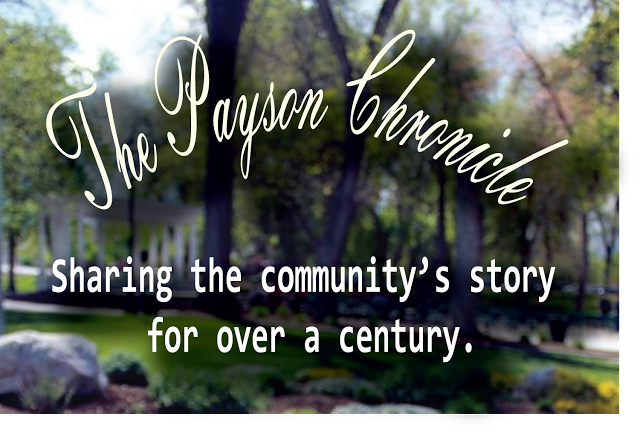By Denise Windley
paysonchronicle@gmail.com
“Thousands have lived without love, not one without water.” -- W.H. Auden
A most--if not the most--critical issue of our time was made the central focus of a town hall meeting Friday evening, May 15, 2015. “Water Issues and Our Future,” which brought together insight from local officials and experts with concerns from citizens in the community, created a space for conversation on a resource that no one can live without.
The event arose at a time of drought and recent changes to the guidelines to secondary water use in Payson. Under the direction of the Payson Lions Club, guest speakers were Payson City Engineer Travis Jockumsen, City Councilman Larry Skinner, Dan Ellsworth, representing the Highline Canal Company, and Payson City Greenskeeper Mark Hyland, sharing tips on how best to conserve and maintain one’s landscape.
By all appearances in recent weeks, abundant rainfall has poured much needed relief onto the parched city. But it has not restored the resource to ‘normal’ levels.
A less-abundant winter snowpack, following several years of drought, had the season starting off at troublingly low water levels at Payson Canyon reservoirs. The Big East Reservoir, among them, was measured at 7-8 feet below its normal level at the onset of spring, according to Travis Jockumsen, City Engineer. The rainfall has lifted water levels here and at Pete Winward and Box Lake, but not enough to put the city in the clear.
New pressurized irrigation restrictions, enacted May 6, were established to curb excessive watering among users in Payson and, hopefully, help sustain resources, he noted. These include watering being restricted from three to just two days per week, with all odd-numbered addresses designated for Tuesday and Saturday watering only and even-numbered addresses to solely Monday and Friday each week. Larger water users, such as churches, schools, city parks, and larger agricultural users, are allowed to water only on Wednesdays and Sundays. Watering times run from midnight to 10 AM and from 6 PM until midnight.
Reservoirs aside, “We get most of our irrigation water out of the Highline Canal,” Jockumsen said. Payson City’s allocation is only 1,500 acre feet a year, he added, highlighting how imperative it is for water users to conserve.
Penalties for those found in violation have been enhanced with the new regulations, Jockumsen added. Still a more cooperative, helping approach was encouraged among residents who witness their neighbors watering out of line.
Of greater concern, however, Jockumsen said, will be the possibility that some may switch over lines should water grow scarcer in the season, which can cause contamination throughout the entire system.
For Councilman Larry Skinner, water and infrastructure to support it in a growing city were high among reasons for which he sought reelection in the last campaign season.
“It’s important that we be forward thinking,” he said last Friday.
Capturing and storing runoff from the canyon is among approaches he cited as a solution to sustaining water for use among an increasing population. At times of ample snowpack, the city’s current reservoirs are incapable of holding water made available through runoff.
To address this, Payson City has contracted with RB&G Engineering to perform a geological study to determine possible locations for a new dam and reservoir in Payson Canyon, Councilman Skinner explained.
One possible location Payson City has its eyes set on is at private property located on the south end of Kiwanis Park. “It could be a sizeable reservoir,” he said, noting that it could accommodate a 165-foot high dam and a reservoir that could sustain ten times the storage the city has available now.
The cost will no doubt be an issue, Skinner conceded, and outside sources will most likely be required to fund such a large-scale project, one that could require a bond election. But, noting that this is the “most critical issue right now in Payson,” he is hopeful that citizens will support it.
Dan Ellsworth echoed a call for infrastructural projects sufficient enough to sustain the current and projected increase usage in Payson, noting that the cost to improve and expand upon systems is imperative. The canal, for instance, is one hundred years old and loses 35% of its water each year. “Something’s got to change,” he said.
The change, he added, would be best approached in cooperation among entities.





No comments:
Post a Comment
Note: Only a member of this blog may post a comment.